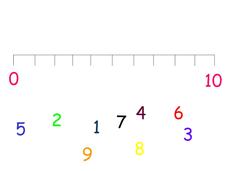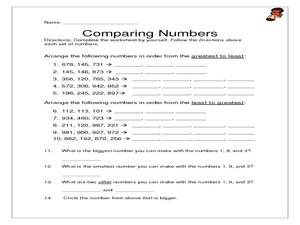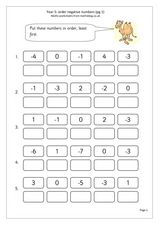Curated OER
Put The Numbers into Order
This presentation should provide good practice for youngsters who are just learning how to count larger numbers, and how to use a number line. In it, learners are given sets of four numbers. They use their computer mouse to click on the...
Curated OER
The Number Line
A simple idea is presented in this mathematics PowerPoint. Young learners see two number lines; 1 - 10, and 11 - 20. All of the numbers that belong on the number line are randomly scattered in the slides. Learners must place the digits...
Curated OER
Arranging Numbers in order up to 1,000
Third graders arrange numbers up to 1,000. In this arranging numbers lesson, 3rd graders play a game to try and build the biggest number they can using number tiles. Students work in groups to draw number tiles from a jar and arrange...
Curated OER
Numbers in Numerical Order
In this numbers worksheet, students cut out 10 hearts with double-digit numbers in them and then glue them onto a blank sheet of paper in numerical order.
Curated OER
Thousands
In this mathematical thousands worksheet, learners place five sets of numbers in order from the smallest to the largest. Students pick out certain amounts of numbers in hundreds and thousands.
Curated OER
Technonumbers: Computers in Preschools
Students explore recognizing, counting and sequencing numbers 1-10. For this primary math introduction lesson, students participate in 6 computer sessions that integrate short films, music and drawing in order to bring beginning math...
Curated OER
Count Backward and Complete the Series #12
In this count backward and complete the series #12 worksheet, learners interactively enter the four missing numbers to complete the series by counting back, then check the answer online.
Curated OER
Complete the Number Series #15
In this complete the number series #15 worksheet, student type the numbers that come before and after the given number, with immediate feedback online.
Curated OER
Order Of Negative Numbers
In this negative number worksheet, learners put 5 integers in order from least to greatest, for five series of both positive and negative single-digit numbers.
Curated OER
Between: Numbers
In this number order activity, students use their counting skills to solve 3 problems that require them to identify numbers that are between the provided numbers.
Curated OER
Between: Numbers 2
In this number order worksheet, students use their counting skills to solve 3 problems that require them to identify numbers that are between the provided numbers.
Curated OER
Arrange in Ascending Order
In this early childhood math instructional activity, students practice their counting skills as they arrange 5 sets of numbers in the correct ascending order.
Curated OER
Numerical Order
In this numerical order worksheet, students cut out the hearts that include the numbers 1-10 and then glue them onto a blank piece of paper in numerical order.
Curated OER
Pumpkin Numerical Order
In this Halloween math worksheet, students read the order of numbers for each pumpkin and then trace the numbers one through ten.
Curated OER
Number Push-ups
First graders integrate math with an upper body movement exercise. Students practice the proper push-up position. The teacher spreads paper numbers in front of the students. (Begin with the numbers 1-9.) Students must "walk" in a push-up...
CK-12 Foundation
Ck 12: Elem Math: Arranging Numbers in Specific Orders
[Free Registration/Login may be required to access all resource tools.] A practice quiz where students must apply their understanding of place value to put a set of multi-digit numbers into the stated order.
CK-12 Foundation
Ck 12: Elem Math: Order Numbers Over 1,000 (Grade 4)
[Free Registration/Login may be required to access all resource tools.] This site features a video and a practice quiz over how to put four numbers over 1,000 in decreasing numerical order.
CK-12 Foundation
Ck 12: Elem Math: Arranging Numbers in Specific Order: Numbers to 1000
[Free Registration/Login may be required to access all resource tools.] A video and practice questions where students are shown how to put a set of numbers up to 1000 into numerical order, which they then try on their own. [2:18]



















